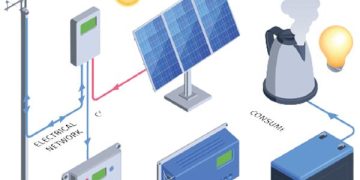In the bustling landscape of modern business, where sustainability meets innovation, the sun has emerged as a powerful ally. Harnessing its energy is not just a nod to environmental responsibility but a strategic move towards economic efficiency. As more businesses turn to solar power, navigating the complexities of solar contracts becomes a critical skill. “” delves into this intricate process, guiding you through the art of securing the most advantageous agreements. Whether you’re a small startup or a sprawling enterprise, understanding the nuances of solar contracts can illuminate your path to energy independence and fiscal prudence. This article will equip you with the knowledge and strategies to transform sunlight into savings, ensuring that your business basks in the glow of a well-negotiated deal.
Understanding Solar Energy Options for Businesses
In the evolving landscape of renewable energy, businesses are increasingly considering solar power as a viable option. Understanding the available solar energy options is crucial to ensure a successful investment. Solar energy systems can be broadly categorized into several types, each offering unique benefits tailored to different business needs. These options include:
- Photovoltaic (PV) systems: Convert sunlight directly into electricity using solar panels. These are ideal for businesses with ample roof space.
- Solar thermal systems: Use sunlight to generate heat, which can be used for heating water or air. This is suitable for businesses with significant heating requirements.
- Concentrated solar power (CSP): Utilizes mirrors or lenses to concentrate a large area of sunlight onto a small area, generating electricity. Typically used for large-scale industrial applications.
- Building-integrated photovoltaics (BIPV): Incorporates solar panels into the building’s structure, providing both aesthetic and functional benefits.
Understanding these options enables businesses to align their energy needs with the right solar solution. Each system comes with its own set of considerations, such as installation costs, maintenance requirements, and energy yield. By analyzing these factors, businesses can make informed decisions and negotiate contracts that align with their financial and operational goals.

Key Contractual Elements to Focus On
When embarking on the journey to secure a solar contract for your business, it is crucial to understand the essential components that will safeguard your investment and ensure long-term benefits. Begin by examining the pricing structure. This includes the cost per kilowatt-hour, any potential escalation rates, and how these compare with current utility rates. Clarity in pricing ensures you won’t encounter unexpected costs down the line.
Another pivotal aspect is the terms of maintenance and warranty. A comprehensive maintenance plan and robust warranty are vital for protecting your solar assets. Ensure the contract outlines who is responsible for maintenance, the duration of coverage, and the specifics of what is included. Additionally, consider the following:
- Performance Guarantees: Verify if the contract includes guarantees for system performance and efficiency.
- Termination Clauses: Understand the conditions under which either party can terminate the agreement.
- Insurance Requirements: Check if there are any insurance obligations to cover potential damages or liabilities.
- Permitting and Interconnection: Ensure that the contract addresses the responsibility for securing necessary permits and interconnections with the local utility grid.
By focusing on these key elements, you can negotiate a solar contract that aligns with your business’s financial and operational goals.

Strategies for Maximizing Financial Benefits
Maximizing financial benefits from solar contracts requires a strategic approach to negotiations. Start by conducting a thorough analysis of your business’s energy needs and future consumption forecasts. Understanding your energy profile will empower you to negotiate terms that align with your operational goals. Partner with an independent energy consultant to ensure that you’re receiving unbiased advice and leveraging market insights. This expertise can guide you in securing competitive rates and favorable contract terms.
In negotiations, focus on key aspects such as contract duration, pricing structure, and potential for scalability. Consider the following strategies to enhance your financial outcomes:
- Flexibility in Contract Terms: Opt for contracts that offer adjustable terms to accommodate potential business growth or changes in energy requirements.
- Incentives and Rebates: Negotiate for access to available tax incentives, rebates, or performance-based credits to reduce upfront costs and ongoing expenses.
- Risk Mitigation Clauses: Ensure the contract includes provisions that protect against unforeseen circumstances, such as equipment failure or changes in energy regulations.
By employing these strategies, your business can not only secure a beneficial solar contract but also ensure long-term savings and sustainability.

Evaluating Long-term Implications and Sustainability
When negotiating solar contracts, it’s essential to consider the long-term implications and the sustainability of the investment. Here are a few factors to keep in mind:
- Energy Savings Projections: Evaluate the estimated energy savings over the life of the contract. Consider how these savings align with your business’s growth plans and future energy needs.
- Environmental Impact: Assess the environmental benefits and potential carbon footprint reduction. Understanding the ecological advantages can enhance your company’s reputation as a sustainability leader.
- Maintenance and Operational Costs: Factor in ongoing maintenance and operational costs. Ensure these costs are manageable and do not outweigh the financial benefits.
- Technological Advancements: Consider the potential for technological improvements over time. Will your contract allow for upgrades or integration of newer, more efficient technologies?
By carefully evaluating these aspects, businesses can ensure that their solar investments are not only financially viable but also environmentally responsible, aligning with broader sustainability goals.
To Conclude
In the ever-evolving landscape of renewable energy, securing the best solar contract for your business is not just a strategic move—it’s a commitment to sustainability and future-proofing your operations. As you embark on this journey, remember that negotiation is both an art and a science, requiring a balance of knowledge, preparation, and communication. By understanding your energy needs, researching potential partners, and mastering the nuances of contract terms, you can unlock the full potential of solar power for your enterprise. Embrace this opportunity to illuminate your business’s path with the brilliance of solar energy, and watch as it transforms not only your bottom line but also your role as a steward of the environment. The sun is rising on a new era of business innovation—make sure your company is positioned to thrive in its light.


































